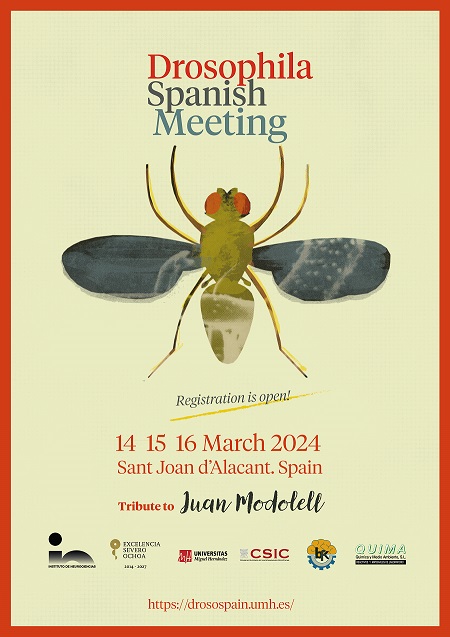The Institute for Neurosciences organizes the first edition of the Spanish Drosophila Conference, March 14-16 2024
19 de March de 2024
The Institute for Neurosciences CSIC-UMH organizes the first edition of the Spanish Drosophila Conference
- The vinegar fly (Drosophila melanogaster) is widely used to study human diseases because it is a very powerful genetic model that is easy to use in the laboratory.
- Registration is open until November 15th, 2023.
Several researchers from the Institute for Neurosciences, a joint center of the Spanish National Research Council (CSIC) and the Miguel Hernández University (UMH) of Elche, have launched the First Spanish Drosophila Conference with the aim of bringing together the community of Spanish researchers who use this organism as a model for their research. The meeting, which will take place from March 14th to 16th, 2024 at the Complejo San Juan (Alicante), is established as a space to show the breadth of science currently done using this model, as well as to promote interaction between researchers in this community.
Drosophila melanogaster, commonly known as the vinegar fly, is an essential organism for addressing complex biological questions, such as neuronal development and functions. For more than 100 years, the use of this animal model has played an essential role in biomedical research, revealing fundamental principles of genetics, development, and physiology, essentials to human health and disease. So far, twelve Nobel Prize winners have received the award for their research in this animal model.

This small animal is a very powerful genetic model, since with only 4 pairs of chromosomes and a tiny nervous system, it allows us to understand in depth how genes generate different phenotypes and facilitates the analysis of the changes occurring in the biological functioning of cells when their genes are altered. Furthermore, the easy handling of flies and their short life cycle make it possible to carry out studies in very large samples, which will not be achievable by using other animal models.
The local organizing committee of this meeting is made up of the IN researchers Javier Morante, who leads the Neuroendocrine control of organ growth and sexual maturation laboratory; José Carlos Pastor Pareja, who runs the Cell-to-tissue architecture in the nervous system laboratory; and Juan Antonio Sánchez-Alcañiz, director of the Neurogenetic basis of behavior laboratory.
The program of this congress will include a tribute to the professor of the Severo Ochoa Molecular Biology Center (CBMSO) Juan Modolell, an international leader in molecular and developmental biology, who died on February 28th, and which will take place in the Salón de actos of the Institute for Neurosciences on March 15th. This event will be hosted by researchers Mar Ruiz and Sonsoles Campuzano, who worked with him at the CBMSO in Madrid.
The organization of this meeting is possible thanks to the support of the Institute for Neurosciences, the UMH, the CSIC, the Severo Ochoa Excellence Program, the start-up BFK-Lab and the company QUIMA (Química y Medio Ambiente S.L.).
Registration to attend this meeting will be open until November 15th, 2023, and can be done by filling out this form.
More information on the official website.
Source: Institute for Neurosciences CSIC-UMH (in.comunicacion@umh.es)

 Español
Español